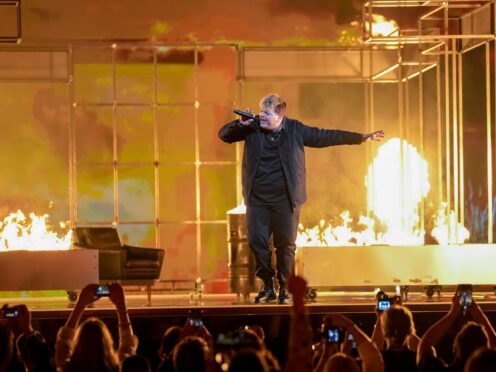Germany’s Eurovision Song Contest entrant Isaak Guderian has said fears at home of him coming last have shifted following his performance on Tuesday.
The former busker, 29, who competed on the German X Factor, delivered a flame-filled staging of Always On The Run featuring powerful vocals during the semi-final at Malmo Arena in Sweden.
He is already though to the final on Saturday, along with other countries in the “big five” – including the UK’s Olly Alexander – who have been performing for the first time in the semi-finals to give them a chance to be seen twice by Eurovision audiences.
Speaking about perceptions of him at home, Isaak told the PA news agency on Thursday: “It was pretty tough in Germany … like, a lot of people were like, ‘Oh, we’re gonna end up in the bottom’ and (people are talking) some political stuff that everyone’s complaining about whatever, (on) German broadcasts or me as a musician, (people asked) why don’t we send a pop star?
“Or I don’t know, ‘we could have sent them (another musician)’ or that would have been better and whatever.
“There were a lot of discussions … but it changed immediately … after my performance and I think that’s fair.”
There has been a lot of controversy around Israel competing and Eurovision artists across Europe have faced calls to boycott the contest.
Isaak, who tapped into his busking roots to surprise journalists in the media centre earlier in the week, also said it “makes a difference” that people are seeing him twice “trying to be as authentic as possible”.
“If I would break my leg or my arm or whatever, and I would lay in hospital and couldn’t be part of the final show, I still say it was absolutely worth it because this is like a huge step for me in the absolute right direction,” he also said.
“And yeah, no matter what’s happening, even if I make it on the bottom five or something, there’s still like millions of people watching me, being me, I’m not playing any role.”
He began his career playing guitar as a child on the street when he was on holiday with his family and did not want to sightseeing.
Isaak said: “I also earned some money as a 12-year-old kid. I earned like, I don’t really remember, it was something like 20 euros (£17).
“But (that) was like, huge for me, it was huge. Like, ‘wow, crazy, I’m able to earn money as a 12-year-old kid, that’s crazy cool’. And all those things together, led to me doing my most free music the next few years, like always everywhere.”
Isaak says that it “didn’t take a long time to realise” he wanted to do this for the rest of his life and he has evolved as a performer since taking part in the German X Factor at the age of 16.
“Nothing could could ever tear me apart from doing music,” he said. “And I don’t know where it comes from but it has always been like that and that’s why I became the musician I am right now.”
